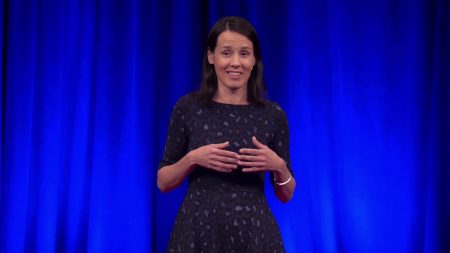You use your brain’s executive function every day — it’s how you do things like pay attention, plan ahead and control impulses. Can you improve it to change for the better?
With highlights from her research on child development, cognitive scientist Sabine Doebel explores the factors that affect executive function — and how you can use it to break bad habits and achieve your goals.
“I have a confession to make. I only recently learned how to drive. And it was really hard. Now, this wasn’t an older brain thing. Do you remember what it was like when you first learned how to drive? When every decision you made was so conscious and deliberate? I’d come home from my lessons completely wiped out mentally. Now, as a cognitive scientist I know that this is because I was using a lot of something called executive function. Executive function is our amazing ability to consciously control our thoughts, emotions and actions in order to achieve goals … like learning how to drive. It’s what we use when we need to break away from habit, inhibit our impulses and plan ahead. But we can see it most clearly when things go wrong. Like, have you ever accidentally poured orange juice on your cereal? Or, ever start scrolling on Facebook and suddenly realize you’ve missed a meeting? Or maybe this one’s more familiar: Ever plan to stop at the store on the way home from work and then drive all the way home instead on autopilot? These things happen to everyone. And we usually call it absentmindedness, but what’s really happening is we’re experiencing a lapse in executive function.
So we use executive function every day in all aspects of our lives. And over the past 30 years, researchers have found that it predicts all kinds of good things in childhood and beyond, like social skills, academic achievement, mental and physical health, making money, saving money and even staying out of jail. Sounds great, doesn’t it? So it’s no surprise that researchers like me are so interested in understanding it and figuring out ways to improve it.
But lately, executive function has become a huge self-improvement buzzword. People think you can improve it through brain-training iPhone apps and computer games, or by practicing it in a specific way, like playing chess. And researchers are trying to train it in the lab in the hopes of improving it and other things related to it, like intelligence. Well, I’m here to tell you that this way of thinking about executive function is all wrong. Brain training won’t improve executive function in a broad sense because it involves exercising it in a narrow way, outside of the real-world contexts in which we actually use it. So you can master that executive function app on your phone, but that’s not going to help you stop pouring OJ on your Cheeerios twice a week.
If you really want to improve your executive function in a way that matters for your life, you have to understand how it’s influenced by context.
Let me show you what I mean. There’s a great test that we use in the lab to measure executive function in young children called the “dimensional change card sort.” In this task, kids have to sort cards in one way — like by shape — over and over until they build up a habit. And then they’re asked to switch and sort the same cards in another way, like by color. Now, really young kids struggle with this. Three- and four-year-olds will usually keep sorting the cards in the old way no matter how many times you remind them of what they should be doing.
……………………………….
So what does this mean for you and for your kids? Well, let’s say that you want to learn Spanish. You could try changing your context and surrounding yourself with other people who also want to learn, and even better if these are people that you really like. That way you’ll be more motivated to use executive function. Or let’s say that you want to help your child do better on her math homework. You could teach her strategies to use executive function in that particular context, like putting her phone away before she starts studying or planning to reward herself after studying for an hour.
Now, I don’t want to make it sound like context is everything. Executive function is really complex, and it’s shaped by numerous factors. But what I want you to remember is if you want to improve your executive function in some aspect of your life, don’t look for quick fixes. Think about the context and how you can make your goals matter more to you, and how you can use strategies to help yourself in that particular situation. I think the ancient Greeks said it best when they said, “Know thyself.” And a key part of this is knowing how context shapes your behavior and how you can use that knowledge to change for the better. “
Source: https://www.ted.com/talks


